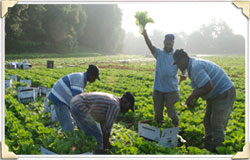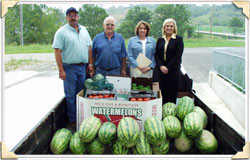Shepherd’s Grain: Strengthening Agriculture of the Middle through Market Aggregation
 Karl Kupers and Fred Fleming founded Shepherd’s Grain in Washington State with the goal of securing transparent prices for their product and sustaining their land for generations to come. Based on an alternative business model that supports regionally identified, high quality and differentiated foods, Shepherd’s Grain markets wheat flour milled from the wheat of 33 farmers in the Columbia Plateau Producers Cooperative. Their farmers employ environmentally friendly farming systems using methods like crop rotation and direct-seed tillage, which are third-party certified by Food Alliance. Shepherd’s Grain goods are distributed through a combination of local and regional distributors, including mainstream companies like the Food Service of America. They process their wheat at an Archer Daniels Midland mill in Spokane, Washington, which offers the proper scale for the collective products of several mid-sized farmers. Through savvy planning, Kupers and Fleming begin aggregating their product two years in advance, collectively setting planting schedules, establishing fair prices with their millers and bakers, and demanding that farmers commit no more than 50% of their crop to Shepherd’s Grain to ensure market diversification for their farms. The Shepherd’s Grain model is exemplary of a “value-based value chain” by emphasizing commitments to both environmental integrity and grower livelihoods in all business transactions, as well as smart control of supply and demand. Says Fleming, “Our kind of farming rewards innovators, saves farms and can change an ecosystem.”
Karl Kupers and Fred Fleming founded Shepherd’s Grain in Washington State with the goal of securing transparent prices for their product and sustaining their land for generations to come. Based on an alternative business model that supports regionally identified, high quality and differentiated foods, Shepherd’s Grain markets wheat flour milled from the wheat of 33 farmers in the Columbia Plateau Producers Cooperative. Their farmers employ environmentally friendly farming systems using methods like crop rotation and direct-seed tillage, which are third-party certified by Food Alliance. Shepherd’s Grain goods are distributed through a combination of local and regional distributors, including mainstream companies like the Food Service of America. They process their wheat at an Archer Daniels Midland mill in Spokane, Washington, which offers the proper scale for the collective products of several mid-sized farmers. Through savvy planning, Kupers and Fleming begin aggregating their product two years in advance, collectively setting planting schedules, establishing fair prices with their millers and bakers, and demanding that farmers commit no more than 50% of their crop to Shepherd’s Grain to ensure market diversification for their farms. The Shepherd’s Grain model is exemplary of a “value-based value chain” by emphasizing commitments to both environmental integrity and grower livelihoods in all business transactions, as well as smart control of supply and demand. Says Fleming, “Our kind of farming rewards innovators, saves farms and can change an ecosystem.”
Indian Springs Farmers Association: Power in Numbers in Mississippi
One way local food systems are successful is by aggregating the work of businesses at different stages along the food chain. Successful models often come in the form of producer cooperatives, which grant farmers ownership over the aggregation and marketing of their goods, and often reduce transaction costs in the supply chain. Started in 1966 with a mere $250 federal grant, the Indian Springs Farmers Association now combines the efforts of three dozen farmers, mostly African American, in six rural Mississippi counties. Farmers join Indian Springs for a modest $200 fee and annual dues of $12, receiving a number of benefits in return, including lower-priced supplies and coordinated growing and sales targets. The cooperative focuses on fresh vegetables, which offer higher margins than commodity crops. Indian Springs offers incentives for its members to diversify their products and members often teach each other how to improve their environmental performance, all of which reinforces an ecological and economic sustainability for their land. The farmers have pooled their resources to build a $500,000 plant where they jointly wash, process, package and distribute their many fruits and vegetables. By aggregating their goods, the growers utilize distribution networks and reach markets generally beyond their individual capacity. Each week, the cooperative pumps between $5,000 and $10,000 into one of the poorest regions of America.
Red Tomato: “Middlehandlers” with a Mission
 Massachusetts-based Red Tomato is committed to building a better food system by utilizing practical business skills, scientific research, market analysis and a mixture of non-profit and market-based change. According to Red Tomato, “We believe in market-based change, but also know that small, innovative development needs support before it can take hold and flourish.” To this end, Red Tomato coordinates production, branding, marketing and distribution on behalf of more than 40 sustainable small and mid-sized fruit and vegetable growers in the Northeastern United States. In 2008, Red Tomato boasted more than $3 million in sales. The organization also makes a commitment to bringing its fresh, ecologically-raised produce to as many consumers as possible, building relationships with eight distributors and reaching conventional and natural supermarkets, independent grocers, co-ops and restaurants across several states. With one foot in the nonprofit world and the other firmly rooted in food business, Red Tomato enjoys its multifunctional role as a marketer, trader and educator in the food system
Massachusetts-based Red Tomato is committed to building a better food system by utilizing practical business skills, scientific research, market analysis and a mixture of non-profit and market-based change. According to Red Tomato, “We believe in market-based change, but also know that small, innovative development needs support before it can take hold and flourish.” To this end, Red Tomato coordinates production, branding, marketing and distribution on behalf of more than 40 sustainable small and mid-sized fruit and vegetable growers in the Northeastern United States. In 2008, Red Tomato boasted more than $3 million in sales. The organization also makes a commitment to bringing its fresh, ecologically-raised produce to as many consumers as possible, building relationships with eight distributors and reaching conventional and natural supermarkets, independent grocers, co-ops and restaurants across several states. With one foot in the nonprofit world and the other firmly rooted in food business, Red Tomato enjoys its multifunctional role as a marketer, trader and educator in the food system
Hardwick, Vermont: “The Town that Food Saved”
A town built upon a booming granite industry that went bust in the 1920s, Hardwick, Vermont, was in desperate need of economic and community revitalization. During the past decade, Hardwick faced a median income 25% below the state average and an unemployment rate nearly 40% above the state average. Starting in 2006, the town’s young artisans and entrepreneurs returned to their roots, banding together to build a thriving economy centered around food and agriculture. Numerous food-related businesses, such as Vermont Soy and Jasper Hill Farm, have set up shop as part of Hardwick’s expanding food movement. They’ve brought with them nearly 100 jobs, a year-long farmers’ market, a large community garden, a non-profit called the Center for an Agricultural Economy, a wildly successful organic seed company, and the Vermont Food Venture Center to aid new agricultural entrepreneurs. Hardwick’s farm-based local food economy has been built upon the steadfast collective effort of residents who assist one another in establishing their businesses, conserving farmland, and producing food sustainably. Farmers and businessmen regularly meet to share experiences, advice, and even capital – thus far, they’ve lent each other $300,000 in short-term loans. As the book documenting Hardwick’s story, The Town That Food Saved, notes: “Hardwick, Vermont, just might prove what advocates of a decentralized food system have been saying for years: that a healthy agriculture system can be the basis of community strength, economic vitality, food security and general resilience in uncertain times.”
Community Farm Alliance: Leveraging the Local Multiplier
 Community Farm Alliance (CFA) is a Kentucky-based membership organization promoting farm-based economic development in rural and urban communities statewide. As part of their work, CFA coordinates an institutional buying program they call L.I.F.E. – Local Innovative Farm Economies. According to CFA, “L.I.F.E. has the power to enhance Kentucky’s fiscal and cultural vitality…A local food system allows Kentuckians to benefit by consuming most of their food from local farms, Kentucky farmers to make a living from their land and opens the door for a new generation of farmers to prosper.” Through the local multiplier effect, CFA estimates that 10 new farm jobs in Kentucky would generate three additional jobs in the local farm service sector, while 10 new local processing jobs would generate six additional jobs in the community. CFA also projects that if Kentucky were to match the national average for per-farm direct marketing sales, it would generate an additional $7.9 million in farm income and $15.8 million for the state as a whole. Diversification money from Kentucky’s Tobacco Settlement offers an unprecedented opportunity to realize this vision by helping Kentucky farmers shift from traditionally tobacco-dependent operations to diversified farm enterprises. Yet, CFA clearly understands the challenges ahead of them: “transforming our food and farm economy will require steadfast cooperation by our citizens, nonprofit organizations, government and public institutions, as well as the private sector.”
Community Farm Alliance (CFA) is a Kentucky-based membership organization promoting farm-based economic development in rural and urban communities statewide. As part of their work, CFA coordinates an institutional buying program they call L.I.F.E. – Local Innovative Farm Economies. According to CFA, “L.I.F.E. has the power to enhance Kentucky’s fiscal and cultural vitality…A local food system allows Kentuckians to benefit by consuming most of their food from local farms, Kentucky farmers to make a living from their land and opens the door for a new generation of farmers to prosper.” Through the local multiplier effect, CFA estimates that 10 new farm jobs in Kentucky would generate three additional jobs in the local farm service sector, while 10 new local processing jobs would generate six additional jobs in the community. CFA also projects that if Kentucky were to match the national average for per-farm direct marketing sales, it would generate an additional $7.9 million in farm income and $15.8 million for the state as a whole. Diversification money from Kentucky’s Tobacco Settlement offers an unprecedented opportunity to realize this vision by helping Kentucky farmers shift from traditionally tobacco-dependent operations to diversified farm enterprises. Yet, CFA clearly understands the challenges ahead of them: “transforming our food and farm economy will require steadfast cooperation by our citizens, nonprofit organizations, government and public institutions, as well as the private sector.”
Woodbury County, Iowa: Political Will that Pays
With evangelical fervor, Rob Marqusee, the Director of Rural Economic Development in Woodbury County, Iowa, advertises the benefits of targeting small family farmers in local economic development policies. “Everything emanates from the land,” he says. “How land is farmed directly impacts matters such as outsourcing, immigration, obesity, global warming, attitudes toward small business, tax incentive and subsidy policies, environment, entrepreneurship, health, family values, volunteerism, community involvement, crime and rural and urban economies.” The county’s economy, historically built upon agribusiness and industrial agriculture, was being drained of approximately $400 million each year from farm inputs and food purchased from outside the region. In response, Woodbury County crafted a trailblazing web of local food policies to give its economy a prompt about-face. In 2005, it adopted an Organics Conversion Policy, which offers a 100% property tax rebate for 5 years to any farmer who converts to organic farming. In 2006, the county enacted a Local Foods Purchase Policy mandating the county to purchase locally grown organic food through a local food broker for various county institutions. In 2007, Woodbury County created its own marketing label for local foods called “Sioux City Sue.” This is in addition to its work recruiting a new generation of farmers in the region, and the marketing consortium it formed with neighboring counties to foster food-based businesses supported by market aggregation. Says Marqusee, “The idea is to create local dependencies and networks that recreate [rural] communities.”

